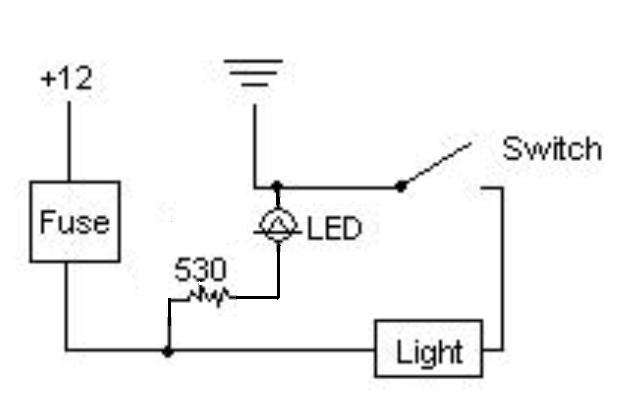Ok so its my first post...
I got a question i plan on having something like this below:

Basiclly what i want to do is run some sort of +12v light (Neons, LEDs, or something ) and have a switch that controls the on/off part and when the switch is on i want a simple LED to light up.. I think i calculated the right resistence thats what the 530 Ohm is for..
now my question is will this work... and what fuse, wires, etc.. do i need. and also does it matter what kind of switch i have.. i am planning on having a simple switch like this
 SPST "Soft-Feel" Push On-Push Off Switch
SPST "Soft-Feel" Push On-Push Off Switch
I am running this application in a brand new 2003 Hyundai Tiburon
- Seven
the way you have that set up the LED will always be on, the cathode of the LED should be connected to the other side of that switch. 530 ohms sounds good for a 20 mA LED. That switch should work. The fuse is really a matter of what is going to be hooked up, check everything that is going to be hooked up and add up the current requirments and figure out the fuse needed. Note: make sure that switch is able to handle the current draw also, or you may need a relay, but most switches should be able to handle it.
what voltage drop..
can u give me an example of the formula for the Fuse what + what = something
i don't think i can use a relay because i am tring to use the exsisting buttons on the center dash and there blanks.. only plastic so i am modifing it to fit the button above..
- Seven
i mean the volatge drop of the LED, the voltage it takes to bias the junction and emit light, many times around 1.7 volts.
for the fuse, say you want to hook up 2 neon lights that draw 2 amps each and a fog lamp that draws 5 amps (just theoretical) then you want 2 + 2 + 5 = 9, therefore you want either a 10, 15, or 20 amp fuse (its not really all that important to be perfectly close since its main purpose is to protect againt shorts)
i c... well i understand the fuse but still not the voltage drop...
if u want u can explain if u don't its ok thax now i know my car wont blow up thanx!
- Seven
you really want me to explain why the voltage drop or just what it is? Ill go with what it is. The LED requires a certain voltage that causes it to operate, it also requires a certain amount of current to work correctly since it is a current controlled device. You start with the supply voltage in this case 12 V (nom), then you subtract the voltage drop caused bo the LED since this will give the true potential between the source and ground, you then figure out the resistor value needed for the current requirment of the LED.
Here is an example.
Say you have a LED with a voltage drop of 1.7 Volts , and a required current of 20 ma (.02 A), and the supply is 12 V
12 - 1.7 = 10.3 V potential difference between the leads.
V = I R (Ohms law) therfore: R = V / I
R = 10.3 / .02 = 515 ohms
thats all i was sayin, 530 ohms is fine if it has Vd = 1.7 and Ic= 20 mA
damn i love physics... hmm thanx for the explanation i hope i get these to work...
btw... i was working on a spare car and was dinking around with the electrical.. i did the exact diagram above but instead of the fuse and it was connected from a trunk light.. both + and - came from the trunk.. something blew and now all the interior lights, clock, (power locks, windows (when car is off)), and gauges go all weird and have no power ... i tested all the fuses and they work fine.. i also disconnected the battery to restart the ECU but it still didn't work... its just a spare car but i would like to get it going again...
- seven

